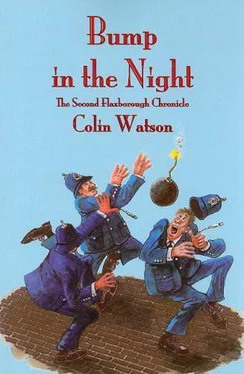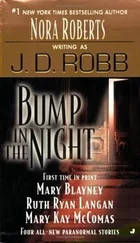Purbright tried desperately to think of some way to block this preposterous inquisition. He saw on Grope’s otherwise expressionless face a twitch of annoyance, or of pain.
“You don’t have to be ashamed of your feelings, Grope,” Larch went on. “You were bound to feel cut up. Even a bit vengeful, perhaps. Is that it? Understandable, you know. Your own flesh and blood.”
This embarrassing parody of Hollywood third-degree, Purbright knew, was simply Larch’s way of taking reprisal for the destruction of his own self-confidence. He was like a blinded man still lashing out when his torturers had departed. But he would have to be restrained somehow. Purbright coughed and was about to interpose a firm “It seems to me...” when he was put off his stroke by a totally unexpected reply from Grope.
“Flesh and blood?” he echoed. “Flesh and blood nothing. If you’re talking about poor Celia, you’ve got it all mixed up.”
Larch looked up at the ceiling. “Ah. Mixed up. Thank you, Grope.” He glared down again. “I suppose you’re going to tell me she wasn’t your daughter.”
“No, I’m not. But you were talking about flesh and blood. And Celia wasn’t. Not ours, I mean. We adopted her.”
Purbright seized his chance. “Now, Mr Grope...”—he sat beside him—“there seems to have been some little misunderstanding. This news of yours is interesting.”
“Why?” Grope countered, with no sign of finding his new interrogator any less provocative. “We never pretended the baby was ours.”
“No, but twenty years is a long time. Things can come to be taken for granted. Tell me, Mr Grope; did you know who Celia’s real parents were—her natural parents?”
Grope said nothing.
“You don’t know?”
“Things like that are confidential.”
Seeing Larch prepared to swoop in once more, Purbright gently waved discouragement. To Grope he said: “They are indeed. You are fully entitled to keep Celia’s origin secret if you wish. On the other hand, you could save us a certain amount of time—in record searching and all that, you know—by telling us now.”
It was a poor inducement, as Purbright knew. But Grope was of an essentially helpful disposition. In any case, the ponderous process of deduction which had been going on in his head ever since Larch opened his assault had now produced something the effect of which he was anxious to enjoy there and then.
He looked away from Purbright and stared boldly at Larch.
“Celia was put out for adoption by Mr and Mrs Pointer,” he announced. “That was straight after she was born, of course. But even so you might say she was really your sister-in-law, Mr Larch. Mightn’t you?”
Chapter Seventeen
Amelia Pointer received Purbright in the garden. Although the shock of acquiring one as a son-in-law had almost worn off, she still regarded policemen with considerable apprehension. Like open umbrellas, they were unlucky things to have in the house.
Hilda had answered the door, prepared her mother for the requested interview (“He looks quite human actually”) and made introductions. She now stood protectively beside Mrs Pointer and motioned Purbright to have his say.
“This isn’t going to be terribly easy,” he began.
“No, of course not,” said Hilda, looking very much at ease. Mrs Pointer shook her head and gave a little smile.
“You may have heard from Mr Larch,” Purbright went on, “that further inquiries are being made into the death of Mr. Biggadyke.”
Hilda spotted some seed pods on a spike of lupins and began nipping them off. “No,” she said.
“Oh. I thought he might have mentioned it. Never mind. The point is, you might be able to help us, Mrs Pointer—in an indirect way.”
“Mother will be pleased to do what she can.” Hilda stretched in search of further seed pods. Her movements were lithe and confident.
“We have a notion, you see—there may be absolutely nothing in it, of course, but you know how policemen move round and round a thing—we have this notion that some connection could exist between a girl called Celia Grope and the way Mr Biggadyke...passed on.”
Mrs Pointer’s lips fluttered like comatose moths suddenly stimulated by a touch.
“Do you know anyone called Celia Grope, mother?” Hilda asked her cheerfully. “No, Inspector; it seems that she doesn’t.”
“But you did, didn’t you, Mrs Larch?”
She eyed him shrewdly. “I vaguely remember the name. Wasn’t she the girl who was killed in a street accident some time last year? Or passed on from one, perhaps you’d say?”
Purbright ungrudgingly marked Hilda one up.
“Neither of you ladies knew Miss Grope?”
“Not personally, no.”
“Mrs Pointer?” Purbright did not enjoy being rude but he felt that Hilda Larch was more likely to respect tactics than tact. However, the snub to the older woman’s guardian and interpreter was of no avail; Mrs Pointer merely looked helplessly at her daughter.
“Celia Grope was an adopted child. Her father told us that much and it was a fairly simple matter to trace her natural parentage from the court records. I tell you this,” Purbright explained, “in case you imagine I have come here to fish for information. I haven’t. The facts have been landed, so to speak. All I ask is a little assistance in weighing them up.”
“You are a very devious policeman,” said Hilda, “and a mysterious one. Won’t you say what this business is all about and what it has to do with us?”
Purbright sighed. “Obviously that is what I must do. I had hoped that making painful revelations was not going to be required. You, Mrs Pointer, know perfectly well what I am talking about. If your daughter really doesn’t know, don’t you think it would be kinder if you told her now yourself?”
Before Hilda could provide an answer on her mother’s behalf, Mrs Pointer broke her silence.
“Twenty years!”
The inspector was startled by the vehemence packed into the two words by a woman who had seemed to possess no more independent motivation than a ventriloquist’s doll. The cry was a harsh compound of anger, pain and pleading. Hilda stared at her mother. From her slowly unclenching hand lupin pods, bruised and split, dropped to the grass.
“Did you have to?” Mrs Pointer made as if to clutch Purbright’s sleeve but her arm remained faltering in mid-air like the limb of a crippled beggar.
A bee droned erratically round their heads. Hilda started, as if from sleep. She pulled out a case and matches from the pockets of her slacks, lit a cigarette, and released a tremulous “Oh, for God’s sake!” with the first drag of smoke.
Mrs Pointer regarded her appealingly. “There seemed no point in telling you dear. Celia never knew.” She looked down at her own hands, pulling at the stuff of her skirt. “I tried to think of her as having been born dead. But of course I couldn’t. It was...” The lips went on moving for a few seconds longer but no words came. Purbright was reminded of an old film running on when the sound track had failed.
Hilda had had time to throw a cloak of anger over her bewilderment and wretchedness. “I take it,” she said coldly, “that you and Daddy had some compelling reason for this extraordinary arrangement?”
“Your father thought...he said it would be better...” Hilda turned abruptly to Purbright. “I’m sorry if you find this embarrassing. Sordid disclosures always read rather better than they sound. You did ask for it, though.”
The policeman shook his head. He spoke gently. “Embarrassment is a selfish emotion, Mrs Larch. I think we can be of much greater help to one another at the moment if we dispense with it.”
“Oh, let’s be clinical, then. You take over the questioning and we’ll have a post-mortem on my sister.” She flashed a look at her mother. “Or half-sister, should I say?”
Читать дальше












